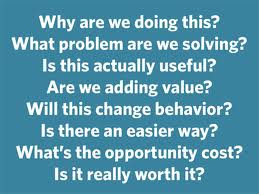 Welcome to O.D. Fridays at DonorDreams blog. Every Friday for the foreseeable future we will be looking at posts from John Greco’s blog called “johnponders ~ about life at work, mostly” and applying his organizational development messages to the non-profit community.
Welcome to O.D. Fridays at DonorDreams blog. Every Friday for the foreseeable future we will be looking at posts from John Greco’s blog called “johnponders ~ about life at work, mostly” and applying his organizational development messages to the non-profit community.
In a post titled “I’m Ashamed?,” John talks about an old Danish proverb that goes something like this: “He who is afraid to ask is ashamed of learning.” This post and the proverb made me think of so many of my friends who are fundraising professionals, and it got me wondering if “shame” has something to do with how they shy away from engaging board members, donors and fundraising volunteers.
Some of you are probably wondering what the heck I’m talking about because every time you show up at a fundraising event you see volunteers running in every direction. So, let me provide a few examples:
 Too many resource development plans (aka fundraising plans) are written behind close doors without any input from those who we depend upon to help with implementation. And then we wonder why no one is jumping in to help and why board members are acting as if to say: “That’s not what I agreed to do … go implement YOUR plan.”
Too many resource development plans (aka fundraising plans) are written behind close doors without any input from those who we depend upon to help with implementation. And then we wonder why no one is jumping in to help and why board members are acting as if to say: “That’s not what I agreed to do … go implement YOUR plan.”- Too many donors make one charitable contribution and then are never heard from again. I don’t see many fundraising professionals picking up the phone, organizing lapsed donor focus groups, meeting individually with, or surveying these donors and asking a few simple questions.
- I certainly hear many of my fundraising friends complain about how their executive director is disengaged from the fundraising program. However, I don’t see many of those folks exhibiting tenacity by asking-asking-asking. There are so many different questions to ask an executive director, and I witness lots of surrendering before they get to the second question.
I could go on and on with examples, but I’ll stop here because I think the better question, which is posed by the Danish proverb, is WHY don’t we ask more questions and WHY don’t we ask for more help?
So, I thought about the WHY and here are some of the possibilities I came up with:
 The Danish are right . . . some people feel a sense of shame in asking for help. It gives people the impression that you’re not capable of doing the task at hand, even though you might be perfectly capable and trying to cultivate, engage, steward, etc.
The Danish are right . . . some people feel a sense of shame in asking for help. It gives people the impression that you’re not capable of doing the task at hand, even though you might be perfectly capable and trying to cultivate, engage, steward, etc.- It is easier to just do it yourself. Asking and involving others usually means investing more time in doing something. Even though a case can be made for it being time well spent, it is easy to rationalize and justify not doing so because your calendar and task list is slammed.
- There is a sense of having “job security” in being the only person making the agency’s fundraising program work.
- Perhaps, it is simply a matter of not caring???
I’m sure there are a number of other possible explanationz, but it is Friday and thought I should ask you for some help. 😉
Please take a moment to ponder WHY and then scroll down and share one additional explanation in the comment box below.
Have you ever sat in a meeting or training, had a question and not asked it? Have you ever been in a board meeting marveling at why a board was making a particular decision and not jumped in with your questions? Have you ever been in front of a donor and not asked a ton of questions about what makes them tick, who they really are, and why they’re giving to you?
After you think through some of these questions, you’ve earned the opportunity to peek at some of the following websites that speak to the issue of asking good questions:
- The Resource Alliance: “7 questions every fundraiser should ask a potential donor“
- GuideStar: “Fundraising’s Four Magic Questions: Answer These and the Gifts are Yours“
- Joan Garry: “10 Good Questions Board Members Should Ask“
- Denver Post: “Five questions every nonprofit donor should ask“
You should also go back to a series of posts I wrote a year ago on this subject:
- DonorDreams blog: “Questions every non-profit board member should be asking“
- DonorDreams blog: “Questions you need to get answered before asking people to join your board“
- DonorDreams blog: “Fundraising questions to ask donors and anticipate from them“
Here’s to your health!
Erik Anderson
Founder & President, The Healthy Non-Profit LLC
www.thehealthynonprofit.com
erik@thehealthynonprofit.com
http://twitter.com/#!/eanderson847
http://www.facebook.com/eanderson847
http://www.linkedin.com/in/erikanderson847




